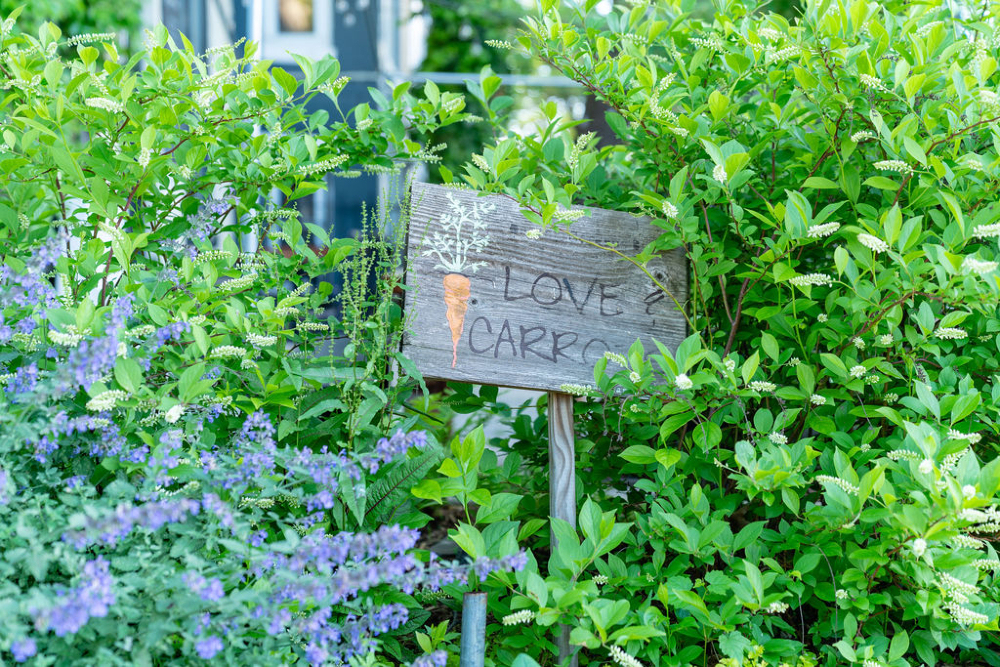Eat
 Photo courtesy of Love and Carrots
Photo courtesy of Love and Carrots
Love and Carrots Continues to Teach Love of Agriculture
May 13, 2020 @ 5:21pm
When Meredith Sheperd founded Love and Carrots in 2011, she hoped to spread a passion for growing fresh food through education and garden installations in the D.C. area. From working with businesses and restaurants to schools and individuals, Love and Carrots has made a name for itself in the District as an innovative business. Now, nine years later, Sheperd and her co-workers are adapting to new circumstances while holding tight to their mission.
“Usually, our business is more diverse [working] with businesses, restaurants and schools making up maybe 40 percent of our installations and care,” Sheperd says of the new standard of business. “Now, it’s really almost 100 percent residential.”
The increase in residential gardening is not entirely unexpected. Looking back at history, many Americans planted “victory gardens” in their yards and in public spaces to reduce the pressure on food supply during the world wars. The present “war” is being fought by staying at home, but the need for fresh, healthy food is still there. Sheperd is delighted to see Washingtonians look to their own yards as a way to provide for themselves and their families.
“This year has been particularly exciting because we have all of these people who have never really thought about gardening before [showing interest] due to articles about [planting] victory gardens and what not during this time.”
In her shift from working with businesses to individuals living in apartments or homes, Sheperd and her team have been getting a lot of questions about how to make a garden grow in this area. People call Love and Carrots asking about what grows in the climate, how much they can expect to grow and how much space they will need for a successful garden.
“One of my favorite parts of my job is just teaching people whats possible to grow here, and how much you can grow, what makes sense and what doesn’t.”
Though city-dwellers may worry they don’t have enough space to grow vegetables and greens for themselves, Sheperd emphasizes that the possibilities are truly endless in the world of gardening, “When you’re starting from zero, there’s a lot possible in a small space in this climate so that’s a lot of fun to deliver that news to people.”
Though residential installations have become priority, Love and Carrots is still committed to working with larger communities, companies and schools when they can. An educational garden with the National’s Youth Baseball Academy was in the works prior to the virus, but is currently on hold. Martha’s Table was slated to work with Love and Carrots on a large production garden at their new headquarters, but that will have to wait until Sheperd and her team can safely access the garden space without health concerns. Sheperd and her team had also partnered with the Alexandria housing development authority to build a 3,000 square foot rooftop farm on a new affordable housing and homeless shelter. She is hopeful that the garden can be ready by the time residents move in around late July despite current constraints.
Love and Carrots had set up an educational program for Capitol One employees prior to the pandemic, and Capitol One still wanted to offer the opportunity to workers after the stay at home order was announced. Sheperd set up a webinar tutorial and taught 160 people how to garden from the safety of her home.
“It was just me, a tripod and my iPhone in my backyard,” Sheperd laughs. She and the Love and Carrots team plan on offering more online programming in the future. “It’s an hour of my time, but it’s a lot of impact.”
Sheperd has seen this impact in stories from clients with large gardens sharing their bountiful harvests with neighbors who don’t have space to grow as much. Her own staff has been using their company garden to supplement their groceries as much as possible to avoid crowded super markets. Sheperd herself is taking her personal garden more seriously than she has in the past to keep her family safe, as she has a one year old at home and her wife is immuno-deficient, and to keep herself sane.
“For me, nothing is more stress relieving than getting to spend a few hours in your garden. With everyone holed up in their houses and with everything being so uncertain, more so than just taking a walk [gardening] is something that you can do that has all of these health benefits but also provides you and your family with good food.”
The Love and Carrots mission to bring the joy of agricultural gardening to the District has never seemed so important. Take advantage of your home or community garden to relax or to prepare a healthy meal. And if you haven’t planted your veggies yet, don’t worry, you live in the perfect spot to garden year round according to Sheperd.
“It is never too late to get started gardening in this climate,” she says.
The spring growing season lasts until June, and, if you miss that, fall gardening is always possible to plant for in the summer. So grab some gloves and get gardening!
Find out more about Sheperd’s work on the Love and Carrots website or on their Instagram page @loveandcarrots.







